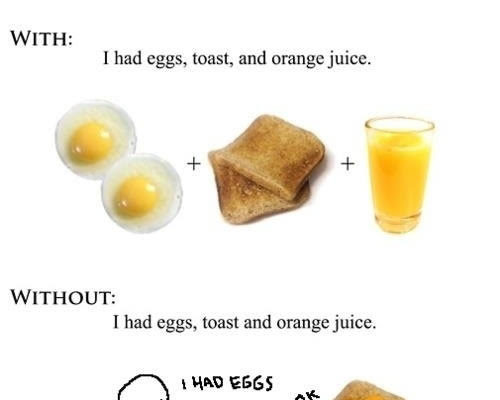Who even cares about the Oxford comma?

While those who are pro-Oxford comma would argue the serial comma is necessary, those against it point out that omitting the comma doesn’t affect the sentence’s clarity. Image by sortee.tumblr.com
By Ally Ortolani
Opinion Editor
I despise the Oxford comma.
Prior to college, my Advanced Placement and honors English classes in high school instilled the idea that the Oxford comma was quintessential to reduce ambiguity. And for those who don’t know, the Oxford comma is after the last item of three or more items. It’s the redundancy for me.
For my fellow journalism majors, we all know that the Associated Press style omits the Oxford comma. Omitting the comma makes everything — in my opinion — much more concise. There was a point in my life where I actually loved using the Oxford comma. But that was prior to college.
My hatred for the Oxford comma partially comes down to the fact that excess punctuation is unnecessary. Seriously, who needs that extra comma? Is it really hurting anyone or confusing anyone if the comma is omitted? The Oxford comma is egregiously overrated and unnecessary.
Just as we are taught to omit unnecessary words, the same should be with punctuation.
One could argue that using the Oxford comma encourages lazy writing. While using the comma could be helpful for clarifying lists, it still — in my opinion — interferes with good composition and writing. The extra comma is an eyesore.
“I spend my days coming up with how I can say everything we want in as few words as possible,” said Sara Woznicki, a blogger for the “As Told Over Brunch” blog. “The more I can condense everything, the more of a win it is for us. So, getting rid of a controversial comma does just that.”
Let’s look at the following example. One could assume most individuals understand the following sentence: “I had eggs, toast and bacon for breakfast.” It does not indicate someone is telling toast and bacon about the rest of breakfast. Who would ever read it that way? Therefore, the Oxford comma is unnecessary.
Further, many arguments made by those who are pro-Oxford comma are built on the idea that the comma is for clarity’s sake. However, the fact that the AP Stylebook — a very reputable source — disavows the Oxford comma should be enough evidence to ditch it entirely.
Think about it: The premier grammar ruling for journalists says we don’t need the Oxford comma. The New York Times and other media outlets don’t use it. The proof is in the pudding.
“And just as many obscure examples can be found to show where presence creates ambiguity,” said senior correspondent Gus Lubin for Business Insider. “In any case, ambiguity can be easily resolved by rephrasing.”
Instead of using the Oxford comma, as Lubin says, simply rephrase the sentence. Of course, the AP Stylebook indicates that if the comma is necessary for clarity the writer should use it.
And to that, I agree. However, omitting the Oxford comma bares no effect on clarity, particularly when listing three or more items.
As someone who is particular about organization and clarity, I understand those who fervently defend the Oxford comma’s honor. However, I don’t agree with those who refuse to use the Oxford comma because they shouldn’t use the comma as a crutch for clarity.
If they write clearly from the beginning, then they don’t need the Oxford comma to “clarify” anything.
Let’s use the following sentence: “We invited the strippers, JFK and Stalin.” Of course, those who are in favor of the Oxford comma would be first to point out the omitted comma.
The sentence could be thought to mean that JFK and Stalin were the names of strippers. However, using the Oxford comma in the example could create just as much — if not more — ambiguity for readers. Instead, changing the word that precedes the ambiguous pairing clears up any confusion.
The corrected sentence would read as: “We invited the stripper, JFK and Stalin.” In this sentence, it clears up the confusion that “JFK and Stalin” are not, in fact, strippers.
At the end of the day, I’m going to peacefully disagree with everyone who loves the Oxford comma. Personally, I don’t understand the need for individuals to defend the comma as if the comma is the Holy Grail of commas.
I’m a journalist, and I intend on writing like a journalist.